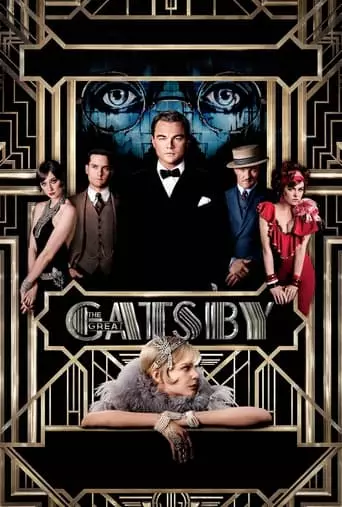An adaptation of F. Scott Fitzgerald’s Long Island-set novel, where Midwesterner Nick Carraway is lured into the lavish world of his neighbor, Jay Gatsby. Soon enough, however, Carraway will see through the cracks of Gatsby’s nouveau riche existence, where obsession, madness, and tragedy await.
The Great Gatsby (2013), directed by Baz Luhrmann, is a visually stunning adaptation of F. Scott Fitzgerald’s classic novel. The story is narrated by Nick Carraway, a World War I veteran who moves to West Egg, Long Island, in the summer of 1922. Nick rents a modest house next to the opulent mansion of Jay Gatsby, a mysterious and wealthy man known for his extravagant parties. Nick becomes entangled in Gatsby’s world and learns of his unrequited love for Daisy Buchanan, Nick’s cousin, who is married to the affluent but unfaithful Tom Buchanan. As Gatsby’s obsession with rekindling his romance with Daisy intensifies, the narrative delves into themes of love, wealth, and the American Dream, culminating in tragedy.
Analysis
Baz Luhrmann’s adaptation is renowned for its lavish visual style and modern soundtrack, blending contemporary music with the Jazz Age setting to create a unique cinematic experience. The film employs vibrant color schemes and dynamic cinematography to convey the opulence and underlying emptiness of the 1920s elite. The performances, particularly by Leonardo DiCaprio as Gatsby and Carey Mulligan as Daisy, capture the complexity of their characters’ desires and disillusionments. While the film takes creative liberties with the source material, it effectively conveys the novel’s exploration of the American Dream’s fragility and the moral decay beneath societal glamour.
Main Themes
- The American Dream and Its Disillusionment: The film critiques the notion of the American Dream, illustrating how the pursuit of wealth and status leads to moral decay and personal tragedy. Gatsby’s rise from poverty to opulence symbolizes the dream’s allure, while his ultimate demise exposes its inherent emptiness.
- Class and Social Stratification: The narrative highlights the rigid class divisions of the 1920s, contrasting the old-money Buchanans with the nouveau riche Gatsby and the working-class characters like George Wilson. This disparity underscores themes of social mobility and the barriers that persist despite outward appearances.
- Love and Obsession: Gatsby’s idealized love for Daisy represents the theme of unattainable desires. His obsession with rekindling their past romance leads to his downfall, reflecting the dangers of living in illusions and the destructive nature of obsessive love.
- Morality and Consequences: The film portrays the moral decay of society, where characters engage in deceit, infidelity, and reckless behavior without facing immediate repercussions. Gatsby’s tragic end serves as a stark reminder of the consequences of living a life based on illusion and moral compromise.
Impact of the Movie
Upon its release, The Great Gatsby (2013) received mixed reviews from critics and audiences. While praised for its visual spectacle and innovative soundtrack, some critics felt that the film’s style overshadowed its substance. Despite this, the film garnered several award nominations, including two Academy Awards for Best Production Design and Best Costume Design, highlighting its artistic achievements. The film’s modern adaptation introduced the classic story to a new generation, sparking renewed interest in Fitzgerald’s novel and its themes.
7 Reasons to Watch The Great Gatsby (2013)
- Visual Spectacle and Cinematography:
Baz Luhrmann’s direction brings the Roaring Twenties to life with vibrant colors, dynamic camera work, and opulent set designs. The film’s aesthetic choices immerse viewers in the extravagance and decadence of the Jazz Age, making it a visual feast.
- Innovative Soundtrack:
The film features a contemporary soundtrack that blends modern artists with classic jazz, creating a unique auditory experience. This fusion enhances the film’s energy and emotional depth, resonating with both contemporary and classic music lovers.
- Strong Performances:
Leonardo DiCaprio delivers a compelling portrayal of Jay Gatsby, capturing the character’s charm and underlying vulnerability. Carey Mulligan’s depiction of Daisy Buchanan adds depth to the role, portraying her complexity and internal conflicts.
- Faithful Adaptation with Creative Flair:
While taking creative liberties, the film remains true to the core themes of F. Scott Fitzgerald’s novel. Luhrmann’s unique style brings a fresh perspective to the classic story, making it accessible and engaging for modern audiences.
- Exploration of Timeless Themes:
The film delves into universal themes such as the pursuit of happiness, the illusion of the American Dream, and the consequences of obsession. These themes are portrayed with depth and nuance, prompting viewers to reflect on their own perceptions of success and fulfillment.
- Cultural Significance:
The Great Gatsby (2013) contributes to the ongoing cultural conversation about wealth, class, and identity. Its portrayal of the Jazz Age offers insights into the historical context of the 1920s, enriching viewers’ understanding of the era’s social dynamics.
- Emotional Resonance:
The film’s narrative evokes a range of emotions, from the exhilaration of Gatsby’s parties to the poignancy of his unrequited love. The tragic conclusion leaves a lasting impact, encouraging viewers to contemplate the fleeting nature of dreams and the realities of life.
How Will You Feel After Watching The Great Gatsby (2013)?
After watching The Great Gatsby, you may feel a mix of awe and melancholy. The film’s visual grandeur and dynamic soundtrack create an immersive experience that captivates the senses. However, the underlying themes of disillusionment and the tragic fate of the characters may evoke a sense of sadness and reflection. The portrayal of Gatsby’s relentless pursuit of an idealized past and the moral decay of society prompts contemplation about the nature of dreams, love, and the human condition. Overall, the film offers a thought-provoking and emotionally charged experience that lingers long after the credits roll.

